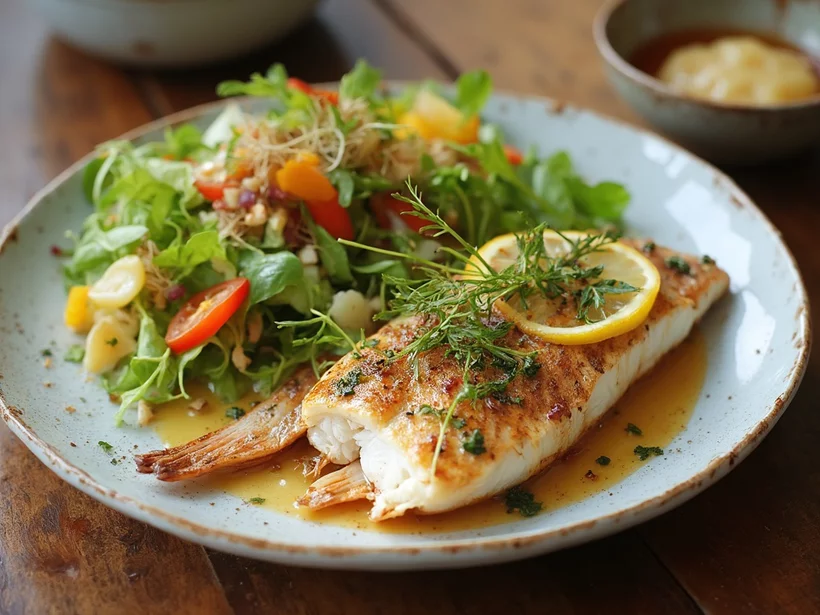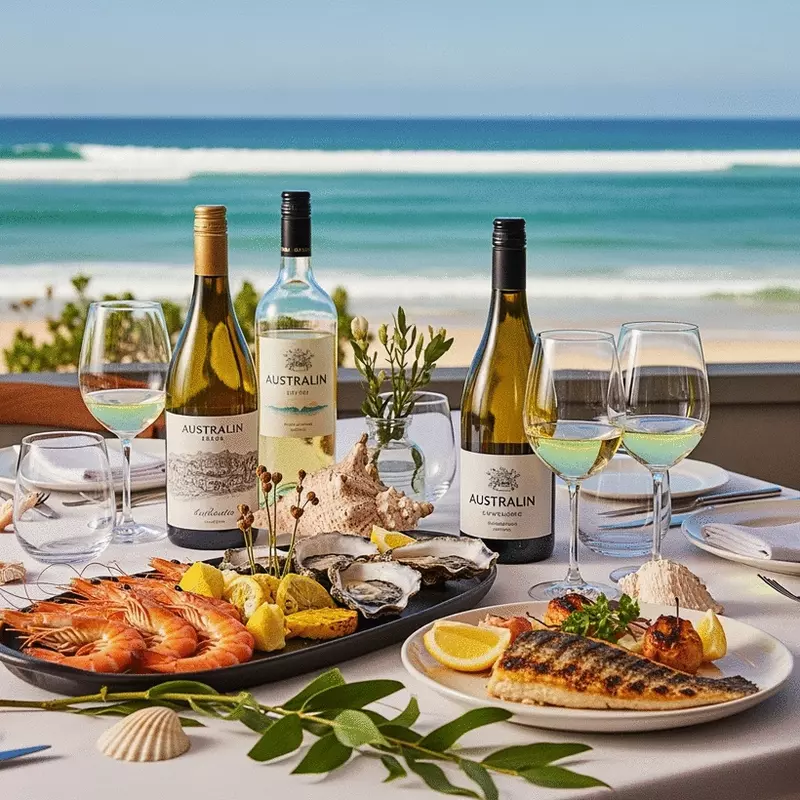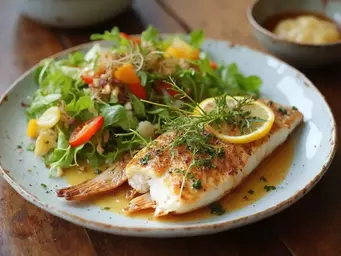Sustainable Seafood Recipes from Australia

As we look toward 2025, the importance of sustainable seafood practices is at the forefront of our culinary choices. With every meal we prepare, we have the power to positively impact our oceans and local communities.
What You Will Learn
- The significance of choosing sustainable seafood for preserving marine ecosystems and supporting local fishermen.
- Key sustainable practices in Australian fisheries, including selective gear use and certification programs.
- How marine conservation efforts contribute to a healthier seafood supply and enhanced culinary experiences.
- The benefits of incorporating local and indigenous ingredients into your cooking for a richer flavor profile.
- Tips for embracing ethical eating and making informed seafood choices that align with your values.
Key Pillars of Sustainable Australian Seafood
The conversation around sustainable seafood for 2025 highlights three crucial areas: responsible sourcing, conservation efforts, and ethical cooking practices. These pillars ensure the ocean's bounty is preserved for future generations.
Understanding Sustainable Australian Seafood for 2025
The conversation around sustainable seafood is becoming more vital as we approach 2025. As a passionate food enthusiast at The Yellow Tail Table, I believe understanding sustainable practices isn't just about making informed choices; it's about celebrating the ocean's bounty while protecting it for future generations. The choices we make in our seafood selection can significantly impact our environment and marine ecosystems.
One key aspect of this journey is recognizing the importance of opting for seafood that is sourced responsibly. The notion of sustainability extends beyond simply choosing fish; it encompasses the entire process of harvesting and distributing seafood, ensuring that we maintain a balance between consumption and conservation.
Importance of Choosing Sustainable Seafood
Choosing sustainable seafood is crucial for several reasons. Firstly, it helps to preserve fish populations and maintain healthy ecosystems, which benefits not only marine life but also our fishing industries. When we opt for sustainable options, we are actively participating in a movement that aims to reduce our environmental footprint. Have you ever thought about the impact of your seafood choices on local communities? Research indicates that sustainable fisheries contribute to better livelihoods and food security in coastal communities.
- Supports local fishermen and communities
- Promotes biodiversity in marine environments
- Reduces overfishing and habitat destruction
- Encourages better fishery management practices
By understanding these points, we can foster a greater appreciation for the seafood on our plates. It’s not just about taste; it’s about making a difference!
Overview of Sustainable Seafood Practices in Australia
Australia has made significant strides in promoting sustainable seafood practices. Many fisheries are adopting responsible fishing methods that ensure our marine resources are available for years to come. As I explore the vibrant seafood markets, I often see a growing selection of species that are caught using sustainable practices. The National Fisheries Plan outlines key strategies for managing Australian fisheries sustainably.
- Use of selective gear to minimize bycatch
- Implementation of seasonal closures to protect breeding populations
- Certification programs like the Marine Stewardship Council (MSC)
- Promotion of aquaculture as a sustainable alternative
These practices not only benefit the environment but also enhance the quality of the seafood we consume. Whenever I prepare a meal using local fish, I can’t help but feel a connection to the ocean and the community that supports it.
Impact of Marine Conservation on Seafood Choices
Marine conservation efforts have a profound impact on the seafood choices available to us. As conservation initiatives progress, we see more fish species recovering, paving the way for sustainable fisheries to flourish. This not only ensures a stable seafood supply but also enriches our culinary experiences by allowing us to enjoy a broader range of flavors and textures. For example, the Fisheries Research and Development Corporation (FRDC) highlights ongoing projects that contribute to the sustainability of Australian seafood.
- Increased availability of previously overfished species
- Enhanced habitats leading to healthier marine ecosystems
- Stronger regulations promoting responsible fishing practices
- Education efforts encouraging sustainable consumption
As we embrace these changes, we contribute to a more sustainable future for our oceans and our plates. So, let's continue to explore and celebrate the beauty of Australian seafood!
Frequently Asked Questions (FAQs)
- Why is choosing sustainable seafood important for 2025?
Choosing sustainable seafood is crucial for preserving marine ecosystems, supporting local fishing communities, reducing overfishing, and ensuring fish populations remain healthy for future generations. - What are some key sustainable seafood practices in Australia?
Australian fisheries employ practices such as using selective gear to minimize bycatch, implementing seasonal closures to protect breeding populations, utilizing certification programs like the Marine Stewardship Council (MSC), and promoting aquaculture as a sustainable alternative. - How do marine conservation efforts influence my seafood choices?
Marine conservation efforts lead to healthier marine ecosystems, increased availability of previously overfished species, and stronger regulations that promote responsible fishing. This, in turn, provides consumers with more sustainable options and ensures a richer variety of seafood. - What are the benefits of incorporating local and indigenous ingredients into cooking?
Incorporating local and indigenous ingredients not only adds unique flavors and nutritional benefits to your dishes but also supports local economies, celebrates Australia's rich culinary heritage, and encourages sustainable food systems. - How can I practice ethical eating in my everyday cooking?
You can embrace ethical eating by researching your seafood sources for certifications like ASC and MSC, prioritizing seasonal ingredients to reduce your carbon footprint, and minimizing food waste by utilizing all parts of your ingredients.
Pro Tip
Did you know? By choosing seafood that is certified by the Marine Stewardship Council (MSC) or the Aquaculture Stewardship Council (ASC), you can ensure that you're supporting environmentally responsible fishing practices. This not only helps preserve fish populations but also supports local fishing communities. Next time you shop for seafood, look for these certifications to make a positive impact!
Embracing Sustainable Cooking Practices in Your Kitchen
Cooking with sustainable seafood is not only good for our oceans but also enhances the flavors of our meals! By choosing seafood that is responsibly sourced, we contribute to healthier ecosystems and support local communities. Have you ever noticed how much fresher and more vibrant a dish can taste when it’s made with quality, sustainable ingredients? Let’s dive into the benefits of integrating sustainable seafood into our everyday cooking.
Benefits of Cooking with Sustainable Seafood
When we opt for sustainable seafood, we are making choices that benefit both our plates and the planet. Here are just a few reasons why you should consider incorporating sustainable seafood into your cooking:
- Healthier Oceans: Sustainable fishing practices help preserve marine life, ensuring that fish populations remain stable and ecosystems thrive.
- Local Economies: Supporting local fisheries and sustainable farms boosts the economy and fosters community connections.
- Better Quality: Sustainable seafood often comes from smaller, local sources which prioritize quality over quantity, leading to fresher, tastier meals.
- Ethical Choices: By choosing sustainable options, you support the ethical treatment of marine life and fishing communities.
As a passionate advocate for Australian cuisine, I believe that embracing sustainable seafood not only benefits our environment but also enhances our culinary experiences. Every time I cook with local fish, I feel connected to the vibrant stories and traditions that shape our dining culture.
Encouraging Local and Indigenous Ingredient Use
Incorporating local and indigenous ingredients into your seafood dishes can elevate your cooking and honor Australia’s rich culinary heritage. These ingredients often bring unique flavors and nutritional benefits that we may not find elsewhere. Some ways to encourage their use include:
- Visit Local Markets: Engage with local produce by shopping at farmers' markets, where you can find fresh, seasonal ingredients.
- Learn Indigenous Techniques: Explore traditional cooking methods and flavor profiles that celebrate Australia's indigenous culture.
- Experiment with Native Ingredients: Incorporate native herbs and spices, like lemon myrtle or bush tomatoes, to give your seafood dishes a distinct Australian twist.
By highlighting local and indigenous ingredients, we not only support sustainable practices but also celebrate the rich tapestry of flavors that Australia has to offer. What are some of your favorite native ingredients to cook with?
Exploring Ethical Eating in Everyday Cooking
Ethical eating is about making conscious food choices that align with our values. It’s essential to be mindful of where our ingredients come from and how they impact the world around us. Here are some tips for embracing ethical eating in your kitchen:
- Research Your Seafood Sources: Look for certifications like ASC (Aquaculture Stewardship Council) and MSC (Marine Stewardship Council) to ensure you’re making sustainable choices.
- Prioritize Seasonal Ingredients: Cooking with seasonal produce not only enhances flavors but reduces the carbon footprint of your meals.
- Reduce Waste: Use all parts of your seafood and vegetables, or find creative ways to repurpose scraps in your cooking.
By embracing ethical eating, we can cultivate a deeper appreciation for our food and the ecosystems that support us. It’s about making choices that resonate with our values and fostering a responsible relationship with the ingredients we use every day.
Recap of Key Points
Here is a quick recap of the important points discussed in the article:
- Choosing sustainable seafood helps preserve fish populations and supports local communities.
- Australia is adopting responsible fishing methods, including selective gear and seasonal closures.
- Marine conservation efforts lead to healthier ecosystems and increased availability of previously overfished species.
- Cooking with sustainable seafood enhances flavors and connects us to local culinary traditions.
- Embrace ethical eating by researching seafood sources and prioritizing seasonal ingredients.









